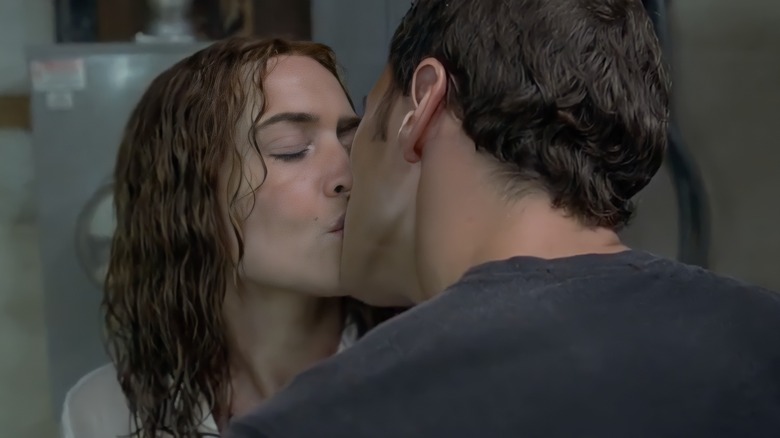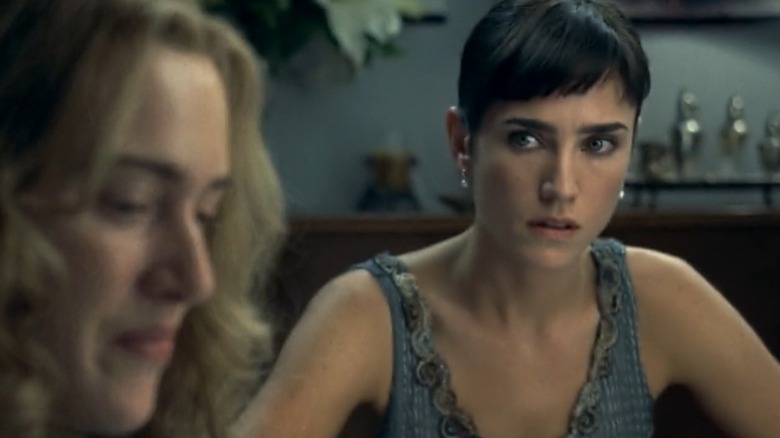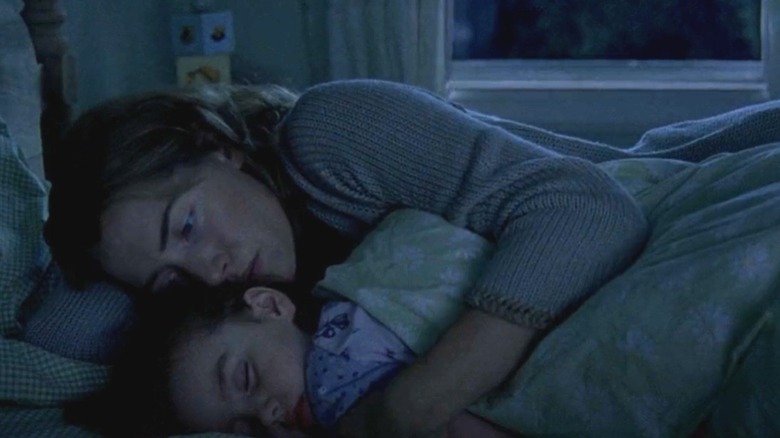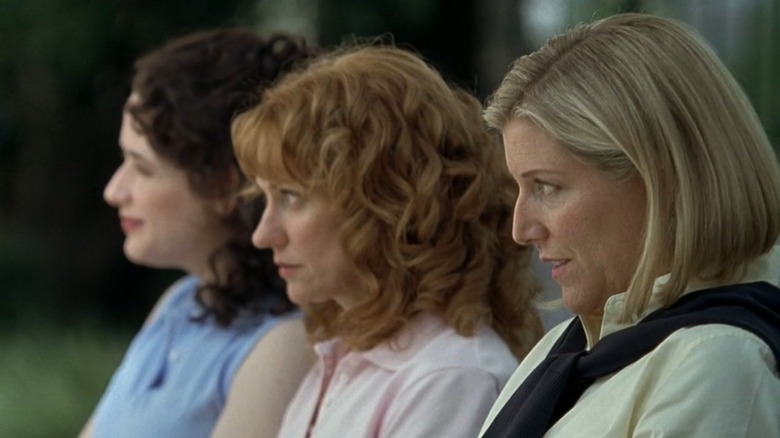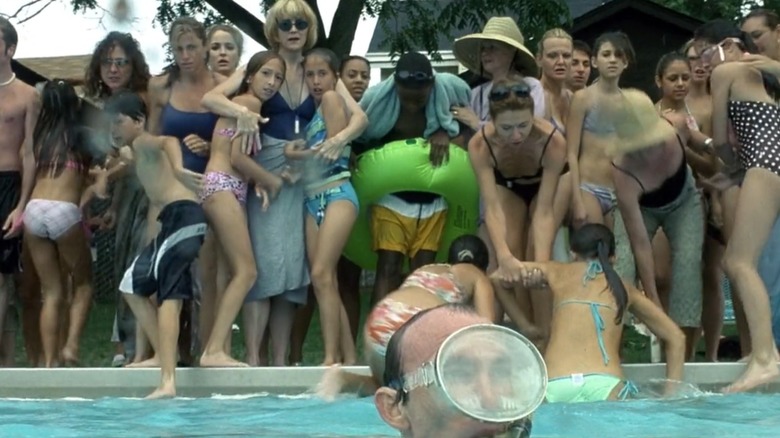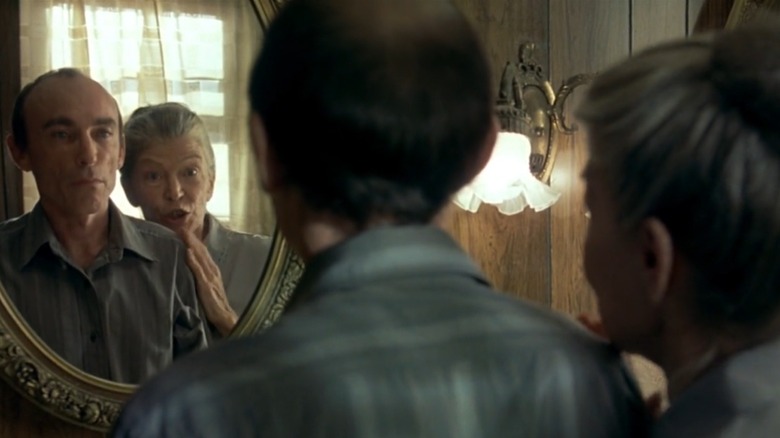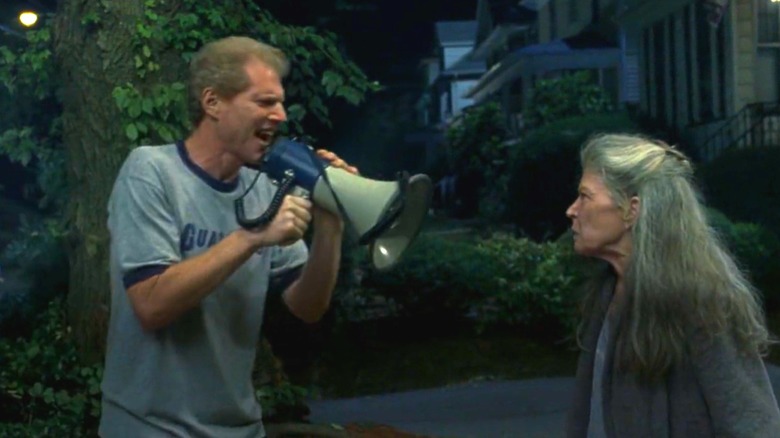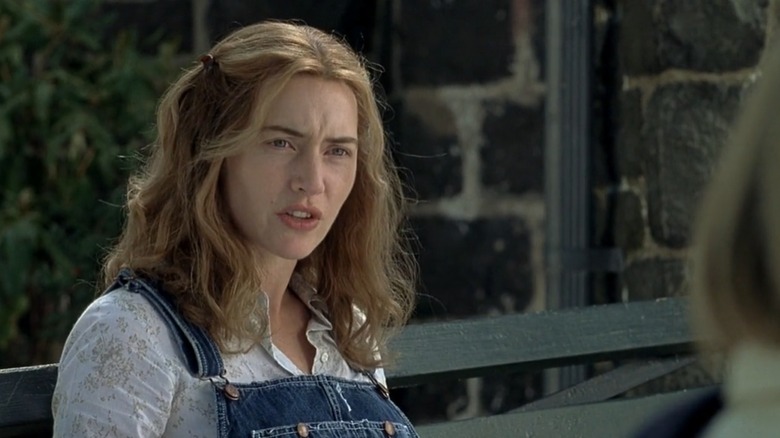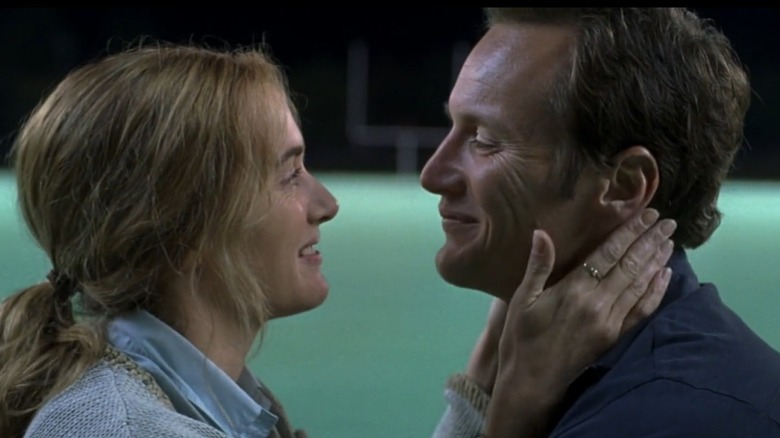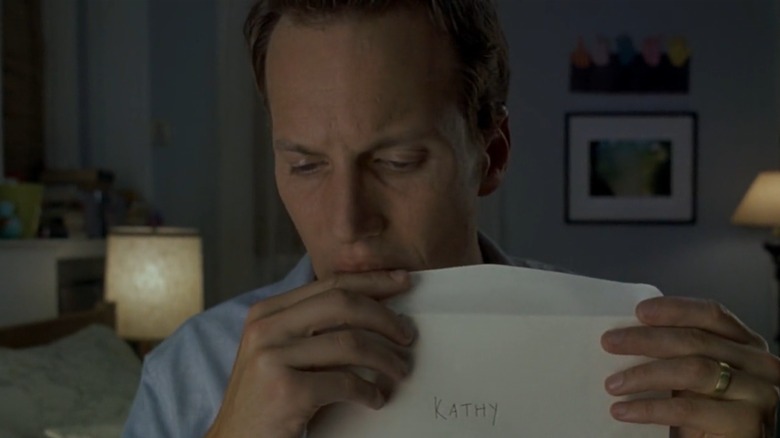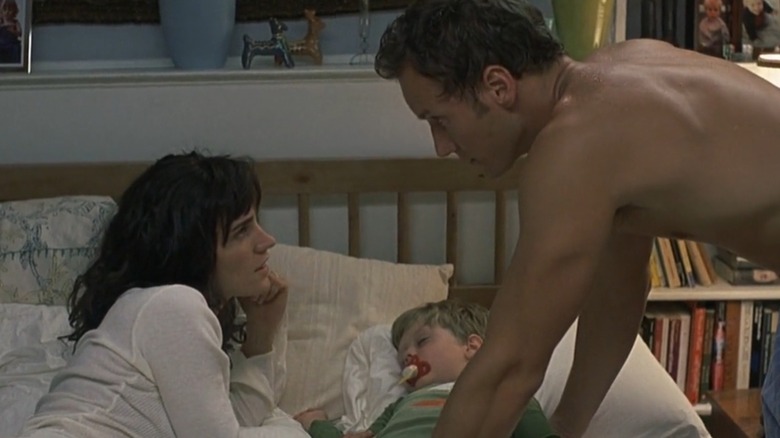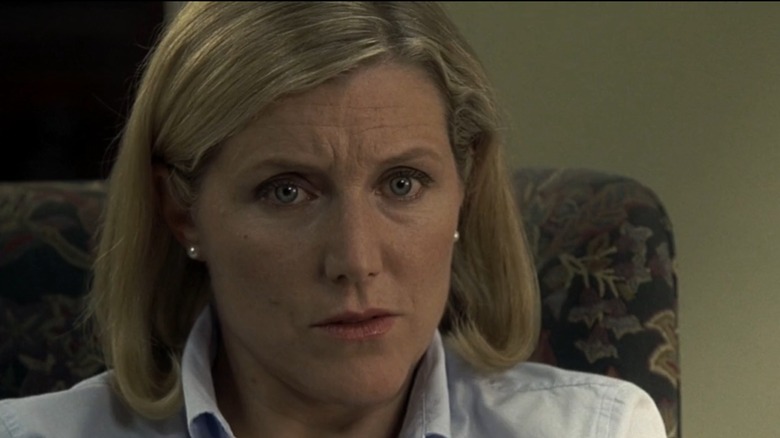The Ending Of Little Children Explained
In contemporary times, Todd Field is likely more associated with his elegant deconstruction of a formidable conductor in "Tár." However, before "Tár" and its powerhouse Cate Blanchett performance became Field's hallmark, he garnered equal acclaim for his collaboration with another actress who is renowned as a luminary in the craft: Kate Winslet.
Todd Field's introduction to the book "Little Children" occurred during his endeavor to adapt another Kate Winslet film, "Revolution Road." Regrettably, this effort was derailed by creative differences with the book's owner. As Field embarked on adapting "Little Children," he chose to collaborate on the movie's script with the book's original author, Tom Perrotta.
The outcome was a multifaceted movie that earned three Academy Award nominations, a film where the audience is consistently confronted with the flaws of the characters they begrudgingly find themselves supporting. However, it's the conclusion that leaves a lingering impression. "Little Children" achieves the remarkable feat of delivering a conclusion that feels both conclusive and enigmatic. There's a very thin line that separates an incomplete ending and an open-ended ending, and we might have clues about how "Little Children pulled it off. So without further delay, let's delve into the ending that the esteemed Roger Ebert aptly labeled a "sucker punch."
What you need to remember about the plot of Little Children
A peaceful upper-middle-class community is thrown off balance when news circulates about the impending return of Ronnie (Jackie Earle Haley), a middle-aged sex offender who is slated to live with his mother (Phyllis Somerville) in the neighborhood. This revelation understandably sparks concern, especially since the entire area is populated by young families.
This single event acts as a subtle catalyst, setting off a chain reaction of introspection among certain community members. Brad (Patrick Wilson) crosses paths with Sarah (Kate Winslet), and both find themselves feeling like empty shells, unable to fulfill their desired lives despite enjoying relative comfort and financial stability. They experience a sense of confinement as if trapped in gilded cages, yearning for deeper meaning. The two start an affair that ends up not only affecting their family but at least two other families in the area.
Meanwhile, Larry (Noah Emmerich) grapples with the aftermath of mistakenly shooting an innocent child at the mall, a tragic event that resulted in his wife leaving him. In an attempt to divert his thoughts, he initiates a one-sided friendship with Brad and channels his internal turmoil into harassing Ronnie's mother. As the story unfolds, the lives of these characters gradually intersect, propelling the narrative toward its enigmatic resolution.
What happens at the end of Little Children
All the escalating tensions within the narrative finally reach a crescendo in the end. It commences with Brad ultimately making the choice to leave his wife. Throughout the movie, Brad is depicted as never fully committing to anything. He doesn't take his bar exam seriously, he refrains from engaging in skateboard tricks with the kids, and even his affair with Sarah isn't necessarily driven by a deep infatuation with her. However, an injury he sustains while en route to meet Sarah prompts him to reconsider his decision.
Brad's actions subsequently result in him standing Larry up, leaving Larry to grapple with his feelings of rejection in the only way he knows — by harassing Ronnie's mother. Tragically, this leads to Ronnie's mother suffering a fatal heart attack. Distraught and guilt-ridden, Ronnie then attempts to castrate himself. Following this horrifying turn of events, Ronnie heads to a children's park, presumably waiting for his life to ebb away from bleeding.
Coincidentally, this is the same park where Sarah awaits Brad. Initially, Sarah's apprehension upon encountering Ronnie is understandable, given that she is with her child (Sadie Goldstein). However, she soon comprehends that Ronnie is in mourning. Sarah attempts to provide solace to Ronnie in a maternal manner, leading her to recognize that she has lost sight of her own child. She retrieves her child and returns home, seemingly reconsidering her plan to run away with Brad.
What's the meaning of the ending of Little Children
The movie's title provides a big hint about its central theme — parenthood, particularly with a focus on matriarchy. Unlike films like "Lady Bird," which directly explores matriarchy through the eyes of a rebellious daughter, "Little Children" looks at this theme more indirectly from the parents' perspective. It covers a range of scenarios: mothers content with their nurturing role in Mary Anne's group, those like Sarah who are still figuring out motherhood, those dealing with wayward children, and even working mothers balancing their jobs with raising their children.
What makes the movie brilliant is that it doesn't assume the audience is morally superior to the characters. No matter how much these mothers might appear to go astray, the film portrays them positively. In the final scene, Sarah's encounter with Ronnie mourning his mother triggers a realization. She understands his pain by seeing him through a maternal perspective. This insight prompts Sarah to confront her own shortcomings as a mother and motivates her to mend her relationship with her child.
Similarly, Brad, as he contemplates leaving his family, takes a moment to reassure his son of his unquestionable love. This reflects the subtle play on words that a movie titled "Little Children" is actually about parenthood.
Another potential interpretation of the ending
In "Little Children," there's a seemingly inconsequential scene around the middle where Sarah participates in a book club with her neighbors, discussing "Madame Bovary." This apparently small moment gains significant meaning as the story progresses. It becomes crucial when the audience learns that Sarah, based on her own experiences, grasps that she can no longer pass judgment on the main character of the book. She comes to realize that while she might have initially seen the character's affairs as morally objectionable, she now views them as empowering, and perhaps even feminist.
Throughout the film, subtle character arcs encourage viewers to question the worth of passing judgment on their neighbors. The theme of judgment comes to light through the predicament faced by Sarah's husband, Richard (Gregg Edelman), who grapples with his apparent overindulgence in adult content online. This narrative thread reveals that nearly everyone in Richard's life is harboring secrets. With neighbors concealing secrets that could potentially shatter their families, the film prompts contemplation: Who are they to criticize him? More importantly, who is the audience (with secrets of their own) to pass judgment on Richard — or on anyone, for that matter?
"Little Children" acknowledges that every character has flaws, yet none of these flaws are depicted as intolerable. By extension, the audience is encouraged to adopt a less judgmental stance towards one another.
What happened to Ronnie at the end of Little Children
In "Little Children," the community profiles Ronnie due to his past crimes, and occasionally, the audience might feel sympathy for him. However, this viewpoint is challenged when Ronnie goes on a date organized by his mom. During this date, it becomes evident that he hasn't undergone any significant rehabilitation.
Ronnie attends the date solely to alleviate his mother's concerns. She frets over his ability to care for himself, even expressing worry about his capacity to handle basic tasks like doing the dishes. Tragically, Ronnie's mother passes away after a stressful trip to the hospital. Upon returning home, Ronnie resolves not to let the promises he made to her go in vain. The first thing he does is, fittingly, wash the dishes.
This action indicates that Ronnie is finally prepared to take care of himself, embracing responsibility and showing initiative. He subsequently reads his mother's letter urging him to be a good boy, and this letter shatters him. Motivated by this, he takes a profound step to atone for his terrible crime: He decides to castrate himself. While extreme, this decision underscores Ronnie's readiness to acknowledge accountability for his actions. Jackie Earle Haley as Ronnie gives one of the best performances in the entire movie and was rightfully nominated for an Oscar.
What happened to Larry at the end of Little Children
Larry stands out as one of the most intriguing supporting characters throughout the movie. Although the audience is not granted an extensive glimpse into his life, it's apparent that he's plagued by instability. Much like the hidden struggles that shape our neighbors, Larry's true internal turmoil remains largely unseen. As the movie unfolds, fragments of information surface, shedding light on what has led Larry to relinquish control over his life.
What remains evident is his use of the Ronnie situation as a canvas to project his guilt and life frustrations onto him. It's as if Larry believes that by seeking vengeance against Ronnie, he can finally absolve himself. This sentiment isn't baseless; Larry was once a cop who tragically shot an innocent child at the mall. This single act caused his wife to depart and his neighbors to shun him.
Larry's downward spiral ultimately contributes to Ronnie's mother suffering a heart attack, which, in turn, drives Ronnie to harm himself. Amidst this turmoil, Larry encounters Ronnie and takes it upon himself to provide assistance. While Larry never anticipates this role, he fully embraces it. This experience awakens a realization within Larry: Redemption is found not in seeking revenge, but in offering aid to those in the neighborhood who need it.
If you or someone you know is struggling or in crisis, help is available. Call or text 988 or chat 988lifeline.org.
What Kate Winslet had to say about the ending
During a detailed discussion of the movie on "Charlie Rose," Kate Winslet offered insights into its ending. "Little Children" has an ending that, while it isn't exactly a cliffhanger, is certainly intentionally left open to audience interpretation. Winslet expressed her satisfaction that the film's conclusion simply generated discussions among fans in the first place.
Winslet also shared a personal observation — mothers at playgrounds occasionally indulge in fantasies about affairs. That aspect of the story certainly resonated with her and drew her to the film due to its authentic portrayal of real-life experiences. According to Winslet, "Little Children" eschews the notion of fairytale endings, reflecting the unpredictable nature of reality.
Interestingly, Winslet's involvement in the movie was influenced by her appearance in another introspective exploration of the human experience of love and breakups, "Eternal Sunshine of the Spotless Mind." The director said on "Charlie Rose" that, having seen Winslet's performance in that film, he believed she was a perfect fit for the character Sarah in "Little Children." Winslet admitted feeling a profound connection with the narrative of a woman struggling with self-perception and found the experience of working on the film to be somewhat cathartic.
What will happen to Sarah
Despite Brad's actions leading Sarah to return home, it's highly unlikely that she will choose to stay. From the very beginning of the movie, Sarah establishes herself as someone who doesn't fit the mold of a typical suburban wife. Even the big house fails to resonate with her; her only real connection with it is with a single room where she can be alone.
As her interactions with Brad unfold and she becomes aware of her husband's habits, Sarah starts to contemplate her own desires. A chance encounter with Ronnie in the park triggers a profound realization: Ronnie was only loved in this world by his mother, underscoring Sarah's own emotional neglect of her daughter, Lucy.
Upon returning home, a significant transformation occurs as Sarah displays genuine enthusiasm for engaging with Lucy — for the first time in the entire movie. Finally, Sarah discovers a true sense of purpose: nurturing Lucy. Nevertheless, this doesn't alter her recognition that her marital relationship lacks passion. In fact, Kate Winslet, who portrayed Sarah, predicted on the show "Charlie Rose" that her character would likely leave her husband shortly after the movie concludes. Winslet said she understood her character's journey to be a reawakening that gives her a new sense of self-worth. With that reawakening, there's no way she can stay in an unhappy marriage.
What will happen to Brad
Before crafting this movie, Todd Field originally set his sights on "Revolutionary Road." However, he eventually landed on "Little Children," which could be considered a more fitting choice for conveying a similar message about the prevailing discontent within suburban families. As "Revolutionary Road" is a mid-20th century period film, "Little Children" may have even provided a better story through which to discuss issues surrounding American families. One such issue involves the emasculation of the stay-at-home dad, exemplified through Brad's character. Brad serves as the primary caregiver for his son Aaron (Ty Simpkins), proving to be a capable father. Yet his emasculation arises from his uncertainty about his life's direction. His affair with Sarah provides him with a minor confidence boost, prompting him to finally take risks. This confidence even helps him make friends and follow up on new interests and passions.
This leads Brad to disregard the bar exam, an endeavor he lacks genuine interest in. He even contemplates leaving his wife, not because he harbors feelings for Sarah, but because he believes Sarah to be the only person who supports him. En route, a minor accident prompts him to realize that he loves his wife and that he only needs to take chances here and there. This time, Brad is willing to embrace risks to pursue his aspirations.
The survival of Brad's marriage post-infidelity
While it may seem that Brad ultimately chose his wife, Kathy, by the movie's conclusion, the truth remains that he still had an affair, and Kathy is well aware of it. Brad leaves her a letter, presumably confessing to his recent involvement with Sarah. Before this, Kathy had already sensed a connection between Brad and Sarah, detecting chemistry during a dinner they shared.
The question of whether their marriage will endure lingers. Several indications suggest it will. When Kathy discusses her concerns with her mother, she vehemently rejects the notion that Brad could be unfaithful, asserting that such behavior isn't characteristic of him. Moreover, unlike Sarah, who shows little remorse for her actions, Brad experiences guilt over the affair.
Kathy begins to actively fight for her family's unity by becoming more present in their lives. Simultaneously, Brad, emboldened by newfound confidence, chooses to take proactive steps instead of simply coasting through life. He may not be interested in law, but at least now he can say it to his wife, and that's a start. While their relationship at the conclusion of the film still requires significant effort, the movie ends with a sense that they are finally on the same page, ready to confront the challenges ahead.
Is there an alternative ending to Little Children
It's a given that when books are adapted into movies, differences are inevitable due to the distinct nature of the two mediums. Books often have a more expansive storytelling approach, while movies excel when they adopt a more concise narrative style. However, these differences in form don't necessarily alter the essence of the story being told.
As previously mentioned, the author of the book collaborated closely with Todd Field on the movie's script. At one point, they considered turning the story into a miniseries but eventually settled on the movie format, which required streamlining certain elements. This led to the removal of storylines involving characters like Mary Ann and the other housewives.
In the book, Mary Ann has a disagreement with her husband and goes for a nighttime walk to cool off. During this walk, she encounters Larry, Ronnie, and Sarah at the playground. In the book version, Ronnie doesn't engage in self-harm. Instead, the four characters have a shared moment of connection, smoking cigarettes and expressing empathy for one another. Larry even offers his condolences to Ronnie for his loss. The divergence between the book and the movie leads to a more conclusive ending in the book, as all storylines are neatly wrapped up during the final interaction among the four characters.
